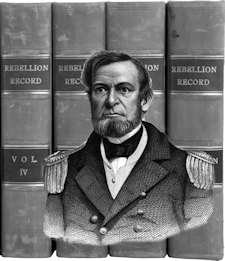January 3.—A detachment of National troops, under Col. Glover, three hundred in number, came upon a camp of rebels, two hundred and eighty strong, nine miles north of Hunnewell, Mo., fired upon and drove in the pickets, when the rebels broke line, leaving guns and hats along in the flight. Glover’s men took eight prisoners before they crossed the railroad, south at the Paris crossing, when they were only half an hour behind the rebels, and expected to bag them before night. The names of the prisoners are Harvey Kincade and John Kincade, Ramsdell Payne, and a fellow belonging to Price’s army named “Jew Davy,” and four others, whoso names are not known. John Kincade helped to burn Salt River bridge and tank, and said the bridge should be burned down as often as built up. — Hannibal Messenger.
—A Scouting party, about seven or eight hundred strong, consisting of six companies of the Coast Guard, six companies of the Twentieth New York regiment, and three companies of Harlan’s Cavalry, left Camp Hamilton, under command of Acting Brigadier-General Weber, accompanied by Majors Vegesack and Carling, of Gen. Wool’s staff. About two miles beyond Little Bethel, the infantry halted, and the cavalry proceeded toward Big Bethel, and six miles east of that place met the mounted picket, which was driven in. The cavalry gave chase, but were unable to overtake them. On arriving at Big Bethel the place appeared to have been deserted, and careful examination showed that to be the case. It had apparently been occupied by three or four thousand men, including two or three hundred cavalry. Breastworks were found nearly half a mile in extent, and pierced for twelve guns. After a short stay, the scouting party returned.—N. Y. Times, January 6.
—Two hundred and forty National troops, who had been held prisoners by the rebels, at Richmond, Va., mostly after the battle of Bull Run, and who had been exchanged for a like number of rebel prisoners, arrived at Fortress Monroe. The rebel steamer Northampton brought them down from Richmond, and, nine miles above Newport News, Va., transferred them to the National steamer George Washington. The scene of the transfer was very exciting. As they stepped once more under the protection of the Stars and Stripes, they could not conceal their joy, and cheer on cheer welcomed them from every vessel as they proceeded down the river. The released prisoners immediately proceeded to Baltimore.—N. Y. Times, January 5.



